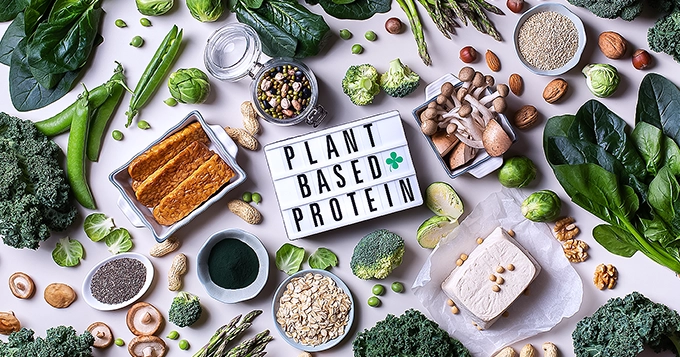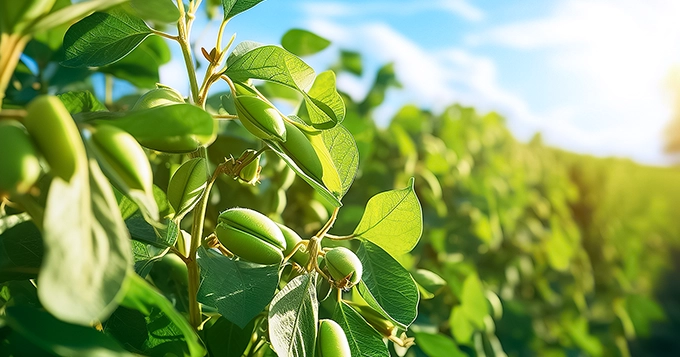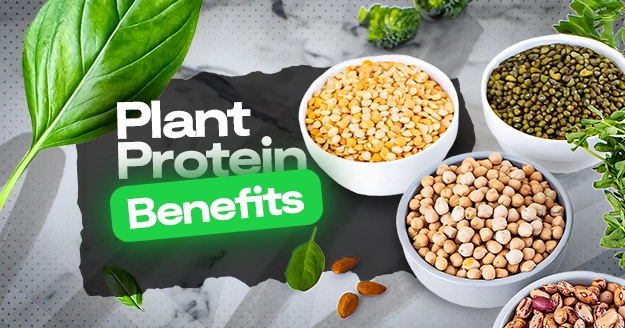Have you ever questioned why more and more individuals are switching to plant-based diets? And is plant-based protein good for you? As the interest in health and sustainability grows, plant proteins are gaining attention for their impressive benefits. Not only do they offer a complete and balanced nutritional profile, but they also contribute to better heart health, weight management, and overall wellness.
Moreover, choosing plant proteins can have a positive impact on the environment, making them a smart choice for both our bodies and the planet. In this article, we will explore why plant protein is good for you and look into the numerous advantages it provides.
What are The Benefits of Plant-based Protein?
When it comes to nutrition, plant proteins offer a wealth of benefits that go beyond just meeting your daily protein requirements. These powerhouse nutrients not only provide essential amino acids but also come packed with vitamins, minerals, and fibers. Plant proteins are full of health benefits, from supporting heart health to helping with weight control, which makes them a better option for keeping a balanced and healthy lifestyle.
- Complete Proteins
One prevalent misconception regarding plant proteins is that, due to their inability to supply all essential amino acids in the required amounts, they are less beneficial than animal proteins. However, this is not entirely accurate. While it is true that most single-plant sources of protein are incomplete on their own- meaning they lack one or more of the essential amino acids- this does not pose a significant barrier to a balanced diet. You can easily get what is known as a complete protein profile by combining several plant-based protein sources to get all essential amino acids in sufficient proportions.
Legumes like beans and lentils are high in lysine but low in methionine, whereas grains like rice and corn are low in lysine but high in methionine. When these foods are eaten together, their amino acid profiles complement each other, resulting in a complete protein.
- Vitamins and Minerals
In addition to being a great supply of necessary amino acids, plant proteins are also a great source of numerous vitamins and minerals that are vital for sustaining general health. Plant-based proteins are a nutritional powerhouse because they provide numerous health benefits, such as strengthening the immune system and promoting the production of energy.
One of the standout features of plant proteins is their high content of dietary fiber. Unlike animal proteins, plant sources such as legumes, seeds, nuts, and whole grains provide significant amounts of fiber, which is essential for digestive health. Fiber supports a healthy gut microbiome, helps to maintain regular bowel movements, and prevents constipation. Further to its ability to decrease cholesterol and assist control of blood sugar, fiber also lowers the risk of heart disease.
Minerals are another essential component found in plant proteins. For example, lentils, chickpeas, and seeds are great sources of iron, which is required for the synthesis of hemoglobin and the blood’s ability to carry oxygen. Magnesium is rich in nuts, seeds, and leafy green vegetables. It is essential for blood glucose regulation, bone health, and the function of muscles and nerves. Zinc, another important mineral found in legumes and whole grains, supports immune function, wound healing, and DNA synthesis.
Vitamins and minerals found in plant proteins contribute to a well-rounded and nutritionally rich diet. These nutrients support essential bodily functions, protect against various diseases, and promote overall health.
- Lower in Saturated Fat
One of the key nutritional benefits of plant-based proteins is their lower saturated fat content. Saturated fats, typically found in higher quantities in animal products such as meat, butter, and cheese, are known to raise the low-density lipoprotein (LDL) blood cholesterol level. One important risk factor for cardiovascular illnesses, such as heart attacks and strokes, is elevated low-density lipoprotein (LDL) cholesterol.
The lower saturated fat content in plant proteins translates into several health benefits. Research has consistently demonstrated a link between lower incidents of heart disease and diets rich in plant-based foods. This is partly because these diets help maintain healthier cholesterol levels and reduce blood pressure, the two critical factors in cardiovascular health.
Moreover, reducing saturated fat intake by incorporating more plant proteins can aid in weight management. Saturated fat-rich foods are often high in calories and, if taken in excess, may cause weight gain. On the other hand, plant proteins frequently have lower calorie counts per serving and are higher in fiber and water, both of which might help you feel fuller and consume fewer calories overall.
Additionally, studies show that a plant-based diet can improve insulin sensitivity and lower the risk of type 2 diabetes. This is crucial because diabetes is a growing health concern globally and is closely linked to diet and lifestyle choices. Plant proteins can help manage blood sugar levels and reduce the likelihood of insulin resistance.
- Lower Carbon Footprint
The total amount of greenhouse gases (GHGs) created during the life cycle of food, from production to consumption, is referred to as the food’s carbon footprint. These gases, which are mostly responsible for climate change and global warming, include carbon dioxide (CO2), methane (CH4), and nitrous oxide (N2O).
- Fewer Methane Emissions – Plant-based foods generally require fewer resources and generate fewer emissions. Enteric fermentation, a digestive process found in ruminants such as cows, sheep, and goats, is a major source of methane, a strong greenhouse gas, associated with livestock farming. Methane has a much higher global warming potential than CO2, making its reduction crucial in mitigating climate change. In contrast, growing plants for food emit significantly less methane and other GHGs.
- Water – is another critical factor in the carbon footprint of food production. Producing animal protein typically requires much more water than producing plant protein.
- Efficiency of Feed Conversion Ratio (FCR) – The FCR for beef is about 6:1, meaning it takes about six pounds of feed to produce one pound of meat. In contrast, the FCR for plant-based proteins like legumes is close to 1:1. This higher efficiency translates into less land, water, and energy usage per unit of protein produced, thereby reducing GHG emissions.
- Transportation and Processing – also play roles in the carbon footprint of food. However, plant-based foods generally require less energy-intensive processing than animal-based products. Furthermore, local production of plant proteins can minimize transportation emissions, especially when compared to the complex supply chains often involved in animal farming.
As global awareness of environmental issues grows, adopting a plant-based diet becomes a practical and impactful way to reduce our individual and collective carbon footprints.
- Accessibility
It is one of the factors which enhances the appeal of plant proteins. Unlike some niche healthy foods or specialized dietary items, plant proteins are widely available, versatile, and suitable for a variety of culinary traditions and dietary needs. This makes them an inclusive and practical choice for people around the world.
Plant proteins such as beans, lentils, peas, nuts, seeds, and whole grains are staples in most grocery stores and markets globally. This broad availability ensures that people from different regions and economic backgrounds can incorporate plant proteins into their diets easily.
- Culinary Versatility
Plant proteins fit seamlessly into diverse culinary traditions. Since ancient times, plant-based proteins have been an integral component of many cultures worldwide. For example, tofu and tempeh are integral to many East Asian cuisines; lentils and chickpeas feature prominently in South Asian and Middle Eastern dishes, and black beans and quinoa are staples in Latin American diets. This cultural diversity not only highlights the versatility of plant proteins but also provides a wealth of recipes and cooking techniques that make it easy to include them in everyday meals.
- Suitable For Various Dietary Needs and Preferences
For those with lactose intolerance or egg allergies, plant proteins are a safe option because they are inherently free of common allergens like dairy and eggs. Additionally, a large number of them are gluten-free, which is advantageous for people who have celiac disease or gluten sensitivity.
Furthermore, for vegetarians and vegans who choose not to eat animal products due to ethical, environmental, or health concerns, plant proteins are an indispensable part of their diets.
Choosing plant protein benefits your health and the environment. They provide essential nutrients, support heart health, aid in weight management, and many more, all while being lower in saturated fats. Embrace and enjoy the benefits of plant proteins and reap the fruit of a healthier and greener lifestyle.








